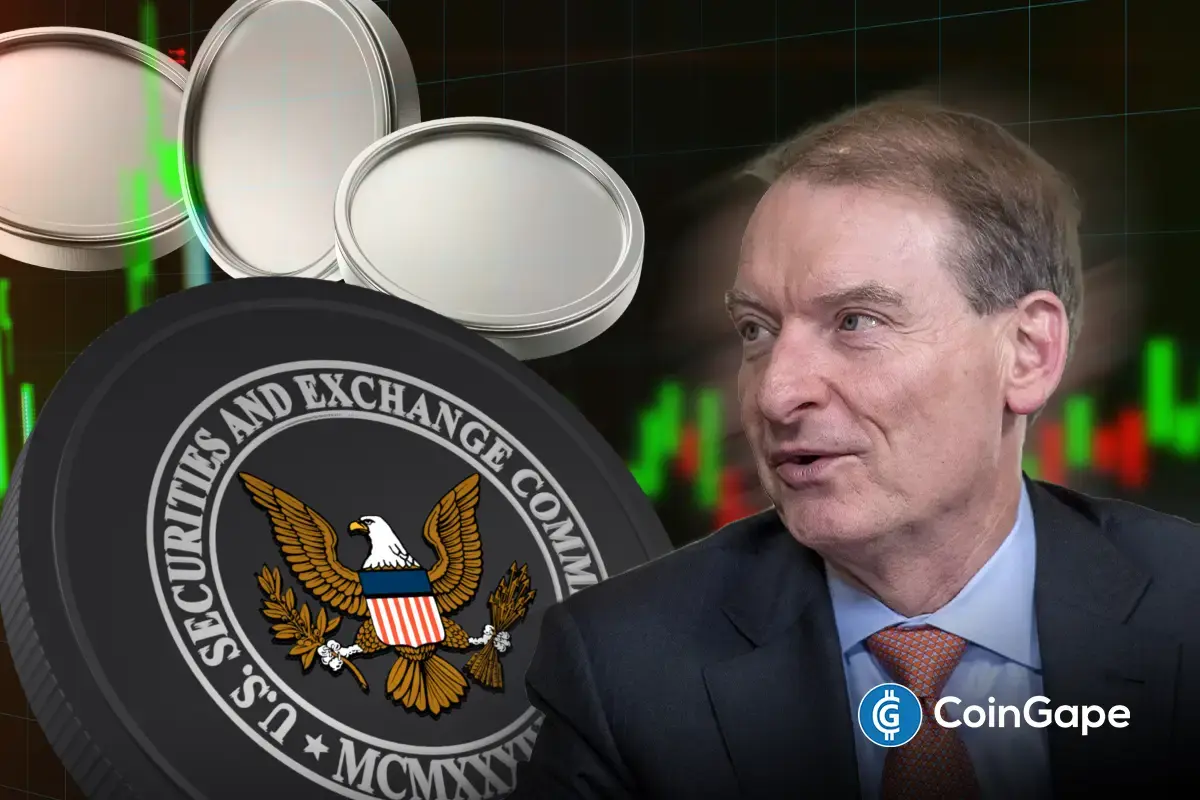Regulation
FDIC Releases Docs on Crypto Debanking Ahead Of Chokepoint 2.0 Hearing

The Federal Deposit Insurance Corporation (FDIC) has released 175 documents related to its supervision of banks involved in crypto activities. The release comes ahead of a court-ordered deadline and coincides with the upcoming congressional hearing on banking practices and financial access.
FDIC Released 175 Documents on Crypto Debanking
According to a recent press statement, the FDIC has made public 175 documents detailing its supervision of banks that engaged in or sought to engage in crypto-related activities. The documents reveal patterns of resistance from regulators, with banks facing extended delays, repeated requests for additional information, and directives to pause or refrain from expanding blockchain and crypto-related operations.
The release follows a court-ordered deadline set for Friday. Acting FDIC Chairman Travis Hill stated that the decision to disclose these documents will increase transparency. The move is also aimed at exceeding the requirements of the Freedom of Information Act (FOIA).
The FDIC had previously disclosed 25 “pause” letters sent to 24 institutions interested in blockchain and crypto-related ventures.
However, the newly released documents include additional correspondence with these institutions, along with communications involving other banks not previously identified.
Travis Hill commented,
“The documents that we are releasing today show that requests from these banks were almost universally met with resistance, ranging from repeated requests for further information, to multi-month periods of silence as institutions waited for responses, to directives from supervisors to pause, suspend, or refrain from expanding all crypto- or blockchain-related activity.”
Congressional Hearing Set to Address Banking Practices
The document release comes just before a scheduled congressional hearing on banking practices and financial access. The hearing is expected to focus on concerns over the FDIC’s previous supervisory approach to crypto-related activities, as well as broader issues surrounding regulatory scrutiny of financial institutions.
Acting Chairman Hill noted that the documents demonstrate a regulatory environment that made it increasingly difficult for banks to proceed with digital asset initiatives. The disclosures indicate that the vast majority of institutions ultimately halted their crypto-related activities due to regulatory obstacles.
Senator Cynthia Lummis Applauds Transparency Move
Following the release, Senator Cynthia Lummis commended the FDIC’s move, emphasizing the importance of government transparency. In a statement, she expressed appreciation for Acting Chairman Hill and the administration for making the documents available to the public.
Senator Lummis also declared an end to what she referred to as “Chokepoint 2.0,” efforts to limit banking access for businesses in the crypto sector.
I am thrilled the FDIC acted swiftly & efficiently to release these documents. I want thank Chairman Hill and @POTUS for your commitment to government transparency! We are putting an END to Chokepoint 2.0.
— Senator Cynthia Lummis (@SenLummis) February 5, 2025
Earlier on, pro-crypto Senator Cynthia Lummis warned former Chair Marty Gruenberg against obstructing Senate oversight. She demanded the FDIC preserve all documents tied to OCP 2.0. Lummis also cautioned against retaliation toward whistleblowers, citing potential criminal referrals.
Plans to Revise Crypto Supervisory Approach
In response to concerns raised by the documents, the FDIC has announced plans to reassess its approach to crypto-related activities. This includes replacing Financial Institution Letter (FIL) 16-2022, a guidance document that is restrictive in engaging with blockchain technology.
The FDIC also intends to collaborate with the President’s Working Group on Digital Asset Markets, established by a recent executive order. The agency will develop a regulatory framework that allows institutions to engage in crypto-related activities while adhering to safety principles.
The Federal Deposit Insurance Corporation, under the previous administration, received a lot of criticism for its alleged anti-crypto actions. Coinbase CLO Paul Grewal accused the agency of trying to “kill BTC transactions” and suppress blockchain technology. He claimed FDIC officials hid key evidence in the FOIA case and misused Exemption 8 to cover their tracks.
Disclaimer: The presented content may include the personal opinion of the author and is subject to market condition. Do your market research before investing in cryptocurrencies. The author or the publication does not hold any responsibility for your personal financial loss.
Regulation
Cash App’s Block Inc Settles for $40 Million Over AML Failures For Crypto Platform

Block, Inc., the company behind Cash App, has reached a $40 million settlement with the New York Department of Financial Services (NYDFS). The penalty follows an investigation into the company’s failure to maintain proper anti-money laundering (AML) compliance.
The NYDFS found that Block had significant issues with its AML program, particularly with its handling of Bitcoin transactions and customer due diligence.
Block Inc. Settles for $40 Million Over AML Failures
According to the NYDFS, Block’s AML compliance program had several critical flaws. The regulator pointed out that Block failed to implement sufficient controls to prevent money laundering and other illicit activities.
The investigation revealed inadequate customer due diligence, especially regarding Bitcoin transactions, which allowed largely anonymous transactions to go unchecked.
According to Adrienne A. Harris, the NYDFS Superintendent, “Compliance functions require growth in order to scale with the size and scale of the company.” The department also pointed out that between 2019 and 2020, Block’s extent of growth inevitably brought about a backlog, particularly with transaction alerts and responses, which were not treated immediately. This led to more transaction volume flow, hence compromising the site’s capabilities and making it vulnerable to criminal activities.
Previous Settlements and Efforts to Improve Compliance
This fine is the second recent sanction of Block for alleged AML failings. Earlier this year, the company settled a similar issue by paying $80 million to 48 state regulators in January. Moreover, another firm, OKX, faced a $1.2M fine in Malta over allegations of breaching AML regulations.
Block, in a statement, also noted that “Cash App has invested large amounts of both financial and other capital into compliance remediation and improvements.” However, the company failed to accept the findings of the report produced during the investigation. Instead, it sought to assure customers that it had taken note of the violations and was working on fortifying its compliance mechanisms to avoid such mishaps.
As part of the settlement terms and conditions, Block’s management has to appoint an independent monitor. This monitor will be tasked with assessing the company’s compliance program progress. These measures will remain ongoing, as the NYDFS will monitor Block’s compliance with regulatory expectations moving forward.
Cash App Under Scrutiny as Crypto Regulations Tighten
Block, Inc. operates Cash App, a peer-to-peer payment service that also allows users to buy, sell, and transfer Bitcoin. Cash App has been regulated under the NYDFS as a virtual currency business since 2018.
The company’s growing role in the cryptocurrency market has made it subject to increased regulatory scrutiny, especially in light of the rapid rise in popularity of Bitcoin and other digital assets. However, addressing Bitcoin’s status, Jack Dorsey warned that limiting BTC’s use case to a digital equivalent of gold could lead to its “irrelevance.”
Concurrently, in addition to settling the latest AML case, Block recently launched a new open-source toolkit aimed at helping companies better manage their Bitcoin treasury holdings. The toolkit includes a corporate Bitcoin holdings dashboard and a real-time BTC-to-USD price quote API.
Disclaimer: The presented content may include the personal opinion of the author and is subject to market condition. Do your market research before investing in cryptocurrencies. The author or the publication does not hold any responsibility for your personal financial loss.
Regulation
US Senate Confirms Pro-Crypto Paul Atkins As SEC Chair

The US Senate has finally confirmed Donald Trump’s nominee, Paul Atkins, as the next US Securities and Exchange Commission (SEC) Chair. This development is significant as Atkins has promised to provide regulatory clarity for the industry, which was lacking under past Chair Gary Gensler’s administration.
US Senate Confirms Paul Atkins As SEC Chair
In an X post, Journalist Eleanor Terrett revealed that the US Senate has confirmed Paul Atkins as the next SEC Chair. The Upper Chamber voted 52 to 44 in favor of Atkins’ nomination for the SEC role.
Pro-Bitcoin and Republican Senator Cynthia Lummis also confirmed this development, sharing her excitement about Atkin’s confirmation as the SEC Chair. The Senator revealed her discussion with him about digital asset legislation and affirmed that she is confident that his leadership will bring positive change.
As CoinGape reported, Paul Atkins had promised during his nomination hearing to prioritize providing regulatory clarity for the crypto industry. The incoming SEC Chair also promised to repair the Commission’s image following Gensler’s infamous regulation-by-enforcement approach.
Paul Grewal, the Chief Legal Officer (CLO) of the top crypto exchange, Coinbase, also congratulated Atkins on his confirmation. He stated that more progress is “sorely needed” after four years of regress.
Disclaimer: The presented content may include the personal opinion of the author and is subject to market condition. Do your market research before investing in cryptocurrencies. The author or the publication does not hold any responsibility for your personal financial loss.
Regulation
US SEC Makes Important Move in Ripple Case, Here’s All

XRP Lawsuit: The U.S. Securities and Exchange Commission (SEC) has filed an opposition to a recent emergency request submitted by Justin W. Keener in the Ripple lawsuit. Keener’s filing aimed to present what he called “decisive evidence” in support of Ripple and the “liberty of the American people.”
US SEC Opposes Keener’s Request Over Jurisdiction and Procedure
According to a recent filing, the US SEC asked Judge Analisa Torres to reject the emergency request filed by Justin W. Keener on April 3, 2025. The agency argued that the District Court does not have jurisdiction to consider the request since the Ripple case has already been moved to the Second Circuit Court of Appeals.
The SEC used several authorities from different courts as the basis of their decision, specifically citing New York v. Department of Homeland Security, 974 F.3d 210 (2d Cir. 2020). The Commission explained that this be the position once a timely appeal is filed that the matters under appeal are beyond the jurisdiction of the District court.
🚨NEW: The @SECGov has just filed an opposition to that “emergency request to present decisive evidence” in favor of @Ripple we saw filed last week by one Justin W. Keener.
The SEC opposes the motion because, they say, that 1) The District Court lacks jurisdiction over the… https://t.co/QNnKM6sOgA pic.twitter.com/4qTU1YEYKw
— Eleanor Terrett (@EleanorTerrett) April 8, 2025
The SEC also pointed out that Keener did not file the appropriate motion to intervene in the case he deemed to involve unlawful conduct by the defendants. They argued that this means that the court cannot consider his request for an emergency stay. They cited other cases where such a motion by the third party without the permission of the court was thrown out of court.
SEC Maintains Ripple Can Handle Its Defense Without Outside Help
In its reply, the US SEC stated that even if the provided evidence of Keener was relevant, Ripple could decide to present it on its own. The agency suggested that Ripple and its legal team know the kind of documents that are useful in the XRP lawsuit on their own.
The Commission added, “There does not seem to be any provision that the Request’s filer cannot forward the ‘evidence’ listed in the Request to the Defendants.” They responded that Ripple could produce any such material if it considered it to be relevant.
The US SEC also reminded the court that a previous request from third parties to submit similar evidence had already been denied. In that instance, Judge Torres ruled that no further intervention from unrelated parties was needed.
Details of Keener’s Emergency Request Remain Unclear
Keener, who has faced separate SEC charges in the past, submitted a brief letter claiming he possessed key evidence in support of Ripple.
He said the material could help the defendants and promote “liberty for the American people,” but he did not give specifics.
While some observers believe the evidence may relate to physical investment contracts, Keener has not confirmed this. The document raised questions in the Ripple community, especially since the case appears to be nearing an end.
XRP Lawsuit Nears Conclusion as SEC Drops Appeal
The SEC’s opposition comes after recent announcements that the legal dispute with Ripple is coming to a close. Ripple CEO Brad Garlinghouse confirmed that the XRP lawsuit has officially ended. This followed the SEC’s decision to drop its appeal in the ongoing case. This move boosted optimism since as of now, around 20 XRP exchange-traded funds (ETFs) are reportedly filed with the US SEC.
Despite the news, XRP’s price did not show a strong positive reaction. Still, many in the crypto community believe the conclusion of the lawsuit may bring new developments for Ripple.
However basking under the XRP lawsuit dismissal, Ripple recently announced a $1.25 billion deal to acquire Hidden Road, a global multi-asset prime broker. This would make Ripple the first crypto firm to own and operate such a platform.
Disclaimer: The presented content may include the personal opinion of the author and is subject to market condition. Do your market research before investing in cryptocurrencies. The author or the publication does not hold any responsibility for your personal financial loss.
-

 Bitcoin19 hours ago
Bitcoin19 hours agoMicroStrategy Bitcoin Dump Rumors Circulate After SEC Filing
-

 Market19 hours ago
Market19 hours agoXRP Primed for a Comeback as Key Technical Signal Hints at Explosive Move
-

 Altcoin23 hours ago
Altcoin23 hours agoNFT Drama Ends For Shaquille O’Neal With Hefty $11 Million Settlement
-

 Altcoin22 hours ago
Altcoin22 hours agoIs Dogecoin Price Levels About To Bounce Back?
-

 Ethereum20 hours ago
Ethereum20 hours agoEthereum Traders Pulling Back? ETH’s Open Interest On Binance Sees Continued Decline
-

 Market20 hours ago
Market20 hours agoSEC Approves Ethereum ETF Options Trading After Delays
-

 Altcoin24 hours ago
Altcoin24 hours agoEthereum Price Signals Strong Recovery After Forming Historical Pattern From 2020
-

 Regulation19 hours ago
Regulation19 hours agoUS Senate Confirms Pro-Crypto Paul Atkins As SEC Chair






















✓ Share: